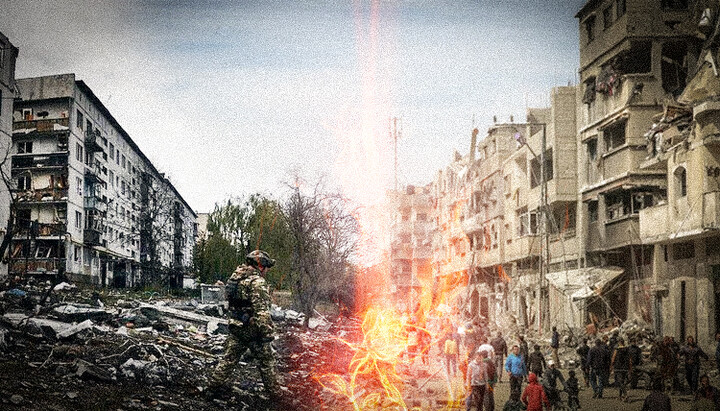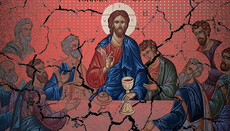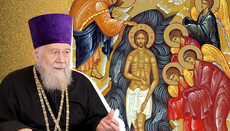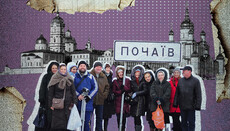For Victory Day: War is the great teacher

Easter, spring, life, eternity – how many wonderful feminine nouns there are in Slavic languages. But among them, there are two sisters that always walk together – war and death.
It’s been a little over eighty years since my thirty-three-year-old grandfather Ivan was wounded in the leg by a shell fragment. He was saved by a German who hid him from his own comrades. My grandfather would suffer for another forty years from osteomyelitis of the bone where the fragment struck. Most likely, that German was just an ordinary working man, driven to war by conscription. Professor Nicholas Stargardt, who wrote a remarkable book, The Mobilized Nation: Germany 1939–1945, based on the study of many diaries, showed that most of the mobilized Germans were neither Nazis nor regime supporters. They were simply driven into war like cattle.
I wish I knew the name of that compassionate German. If he had shot my grandfather back in 1942, my father would not have been born in 1948, and I would not exist.
When my grandparents would say at family gatherings, “The main thing is that there is no war,” I took those words as a mere formality. What kind of war could there be? With whom? Why? Surely, just a little more time, just a little bit longer, and we would be planting apple trees on Mars, and intergalactic flights would become as ordinary as airplane travel.
At least, that’s how it seemed to me at eight years old. But another forty-six years passed, and war did begin. If someone had told me back in 1976 that the house where I lay with my grandfather on the stove bed would be turned into rubble by an aerial bomb, and the cemetery where he would be buried would be torn apart by shells, I would never have believed it. But life often gives us things far different from what we expect.
War took from me everything connected with my youth: the kindergarten and the school I attended, my family home, and everything that once warmed my heart. Apple trees will not grow on Mars as long as humanity is afflicted with madness. I understand nothing about politics, but for some reason, I am sure that the money spent on war could have created a man-made paradise not on Mars, but here on Earth: to feed the hungry, to quench the thirsty, to shelter the needy, to treat the sick for free, and to surround the elderly and orphans with care. But as long as there are forces in this world that profit from death, people will continue to kill each other.
I feel most sorry for those who are ready to build their prosperity on the blood and suffering of innocent people. Oh, if they only knew or could glimpse what awaits them in the life of the world to come, they would curse the day they were born. But the obsession with power and the thirst for profit will, as before, continue to breed wars in our world. War is a vortex that sucks into the abyss of eternal torment the souls that have sold themselves to the devil, and this is the most terrifying fate that can befall a person.
Be that as it may, neither war nor its servants have any future. But there is a future for a ninety-year-old grandmother named Claudia, whom I recently met on the street. Walking past a house, I saw a frail old woman poking at the rocky ground with a knife. As I came closer, I noticed she had made a modest flowerbed of flowers and plants near a little fir tree. In our city, rockets fall regularly, drones armed with bombs fly overhead, dropping their deadly cargo on people's heads. Yet this grandmother was prying stones out of the ground with a knife to plant a daisy there. "Why?" I asked her. "For the soul. It makes my heart happy. I can't live without it. I love beauty," she replied.
Perhaps this is what Fedor Dostoevsky meant when he wrote that beauty will save the world.
Despite everything, our parishioners wake up in the middle of the night on Sunday to prepare food and, after the Liturgy, go to feed the needy. They do this not for a reward, but in response to the call of their hearts. When our children, under the hum of drones and the wail of sirens, prepared an Easter performance, they did it to bring joy to themselves and to their audience. Love, joy, beauty – these are the flowers that grow into eternity through death and war. War will pass, but love will remain.
Death will dissolve in the eternal Paschal Day. Fear and pain will be conquered by unending Joy. Loved ones will embrace each other once again. And only the murderers and their handlers will stand apart as sullen, gray shadows, awaiting the judgment of the Last Day.
Then the pain and torment they caused to others will embrace them with its iron grip and will never let go. If they could see now what awaits them, they would throw away their weapons in horror and choose instead to live out their days in the harshest of conditions just to escape the fate of hell. But it seems they are not permitted to know this.
Here on earth, it may seem that the executioner rules over his victim, that the strong humiliate the weak, that power and money reign over justice and truth. But in the spiritual world, things are quite the opposite – the victim is sanctified, while the executioner rots alive; the weak grow in patience, and demons mock the “strong” tyrant.
A person who brings death does not kill others – he kills himself. For every word and deed in this brief earthly life, there will be an account to give; there is no other way.
War sharpens and exposes what was hidden under a mask of decency during peacetime. The masks fall away, and people show themselves as they truly are, not as they always wanted to seem to others. I know people who lost everything they had: homes, documents, savings, all their possessions. Their lives became entirely different. There was a colossal rethinking of values and priorities. Now these people are happy simply to be alive. It turns out that a person needs very little for earthly happiness in peacetime. A home, bread on the table, and healthy loved ones.
Before the war, many did not understand that they were living happy lives, that everything was good for them, very, very good.
But war came and taught us many things. It taught us to value what we have, to be grateful to God for everything, to live for today because tomorrow may never come. These are important lessons.
And war also revealed the true nature of things. It taught us to understand the essence of life more deeply. Some will emerge from this experience renewed, while others will morally degrade even further. In terms of spiritual growth during wartime, one year is like ten. Everything happens much faster. Things will never be as they were before. We have changed. And our generation will now repeat what our grandparents used to say: “The main thing is that there is no war.”
And how I wish that our descendants would know about it only from hearsay, not from personal experience.
But may everything be according to God's will.











